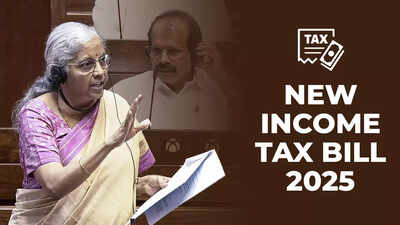The New Income Tax Bill has been passed by the Parliament, marking a significant reform to modernise the longstanding income tax legislation for both individuals and corporations. The New Income Tax Bill 2025 aims to simplify tax procedures and reduce compliance requirements for taxpayers. While the New Income Tax Bill was passed in Lok Sabha on Monday, it cleared the Rajya Sabha today.Finance Minister Nirmala Sitharaman presented the updated version of the I-T bill to Parliament, which included changes suggested by the Parliamentary Select Committee. She had previously withdrawn the initial bill, introduced on February 13, on August 8.The Parliamentary Select Committee, under the leadership of BJP member Baijayant Panda, reviewed the I-T Bill 2025 and finalised their report on the proposed legislation in the previous month. “Almost all of the recommendations of the Select Committee have been accepted by the government. In addition, suggestions have been received from stakeholders about changes that would convey the proposed legal meaning more accurately,” said the Objects and Reasons section of the Income Tax (No.2) Bill.The parliamentary committee proposed 285 suggestions to streamline and update the taxation framework.
New Income Tax Bill 2025: Top points to know
- The proposed legislation reduces text volume and sections by approximately 50%, presenting provisions in a more straightforward and comprehensible manner.
- It simplifies the taxation timeline by eliminating the complex distinction between assessment year and previous year, introducing a unified “tax year” concept.
- The revised I-T bill introduces provisions for taxpayers to claim refunds even when returns are submitted after deadlines, which should provide significant relief to individuals filing their taxes.
- The New Income Tax Bill 2025 retains existing provisions for carrying forward losses, provides tax relief on anonymous donations to religious trusts, and adjusts MSME (micro, small and medium enterprises) classifications to align with the MSME Act, incorporating the panel’s suggested modifications.
- The duration for submitting TDS correction statements has been shortened to two years from the previous six years under the Income-tax Act, 1961. According to I-T department officials, this reduction should substantially decrease complaints from deductees.
- The New Income Tax Bill has additionally provided explicit clarification regarding deductions applicable to commuted pension and gratuity payments received by family members.
- Tax experts indicated that the reforms would simplify compliance procedures for individuals, organisations, MSMEs whilst fostering a reliable, foreseeable and lucid taxation framework, essential for maintaining domestic spending, drawing overseas investments and backing economic expansion.
- Gouri Puri, partner, Shardul Amarchand Mangaldas and Co noted that the initial proposal created uncertainty, particularly concerning residential property taxation, pension deductions and reimbursement procedures for late submissions. “The revised bill addresses these gaps to simplify interpretation, reduce disputes and promote fairness,” said Puri.
- The updated I-T Bill seeks to remove unnecessary and duplicate clauses for improved navigation, systematically reorganising sections for easier reference.
- It employs straightforward terminology to enhance accessibility and has eliminated outdated provisions to achieve better clarity.
- The requirement for compulsory investment and deposit of deemed accumulated income, previously set at 15% of regular income in designated modes, has been eliminated.
- Additionally, clause 187 has been expanded by incorporating the term “profession” following “business”, allowing professionals whose total receipts surpass Rs 50 crore annually to access prescribed electronic payment methods.
“The withdrawal of the earlier I-T bill and the introduction of a revised version demonstrates the government’s responsiveness to stakeholder feedback and the Select Parliamentary committee’s recommendations,” said Gouri Puri said.

